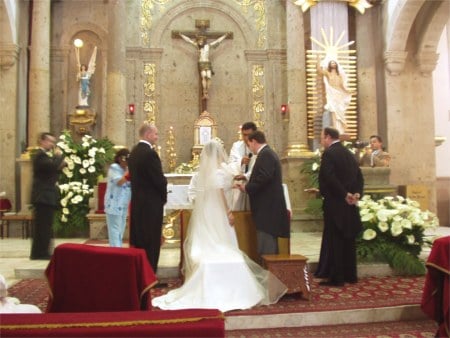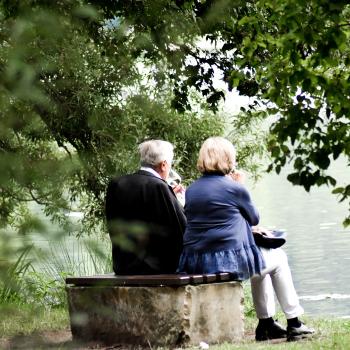That’s the gist of this piece by writer Cara McDonough, who raises a question that’s increasingly common these days. I get several calls a year from people who ask if I can do a wedding for them in a catering hall or on a beach. (Usually, it’s after a priest has turned them down; deacons, of course, are always the last resort.)
McDonough writes:
My sister-in-law is getting married this spring. I’ve tried on my bridesmaid dress, jotted down the date of her New York City bachelorette party and also, intrigued, watched her struggle as she strives to book a priest.
Like me, she was raised Catholic and is marrying one. And, like my husband — her brother — and I did when we got married in 2005, she and her fiancé are trying to make this a Catholic affair.
Trying. Because there are rules.
I remember sitting in the chapel of the Newman Center at the University of Chapel Hill with many other couples during a Pre-Cana conference prior to our own wedding, listening to the priest talk about the importance of our forthcoming unions.
And then, unexpectedly, but with true passion: “You can’t get married outside.” He paused, then repeated, “You just can’t.”
My sister-in-law, however, wants to do just that. Plenty of people do.
Why can’t a Catholic ceremony take place outside? I turned to the wisdom of the internet to help me sort this out, and found many reasons, both casual and, seemingly, from on high.
Catholics marrying non-Catholics can get a special dispensation allowing marriage someplace other than a Catholic church. But if you’re both Catholic, the church wedding is important. The answer, as I’ve interpreted it, mostly concerns the fact that the church is the true “house of God,” and marriage, being a sacrament, should be celebrated there.
The sites Catholic Education Resource Center and Catholic Answers , as well as many others, approach the subject with articles and online forums.
But really, the best explanation I’ve heard was from that priest. “You just can’t.”
But wait, there’s more:
My sister-in-law, however, wants to get married outside due to a combination of factors, including the fact that the reception location is not close to a church and is a lovely place to hold a wedding.
Not to mention that the diocese where she and her fiancé will wed is not one either belongs to, and is rumored to be strict, so may not have allowed them to hold the ceremony in a church there anyway.
She’s been looking for a priest who would agree to marry them at their reception site — outside the house of God, within the house of nature — for several months. She’s had priests outright refuse, refer her elsewhere and one memorable man of God who agreed to do it but only for a considerable sum of money.
Well. As my sainted father used to say: “If you want to belong to the club, you have to follow the rules.” And that’s one way of looking at this. But it helps to look at marriage as what it truly is: a sacrament. It is the tradition of the church that — with some rare and specific exceptions — sacraments are received in a church. Which means, among other things, the ritual takes place in the presence of Jesus Christ, in the Blessed Sacrament. It unfolds before the people of God, the community of faith. And, for marriage, it is witnessed by a minister of the church, a priest or deacon.
But there is also this: being married in a church says something. It says: “We take this seriously, and are making this commitment in a sacred space, in the presence of God, before His people, forever.” It says: “We are beginning our life together in a way that signifies to the world our commitment to each other, and our commitment to our faith, and let’s face it: know we’re going to need all the graces we can get.”
It also says: “This is something more than just a party.”
Another take, and a very good one, from Busted Halo:
The key element to remember about the Catholic understanding of marriage is that it is a public act of the church which recognizes the lifelong and exclusive commitment of the bride and groom to each other. The bride and groom may say “I do” to the wedding vows, but the presence of the church community is meant to support the couple throughout their married life together. All those present are presumed to be saying to the couple “We do.” We do witness, confirm, and support your marriage.
The popular notion that a wedding is primarily the business of the bride and groom is romantic, but not true in the sacramental sense. The church, and all the people of God who witness the marriage, have a stake in the sacrament of marriage. It makes a difference to the community of believers and to society that marriages are freely entered and strong. As Pope John Paul II said, “The future of humanity passes by way of the family.” (Familiaris Consortio, #86)
What’s all this got to do with having a wedding in God’s beautiful outdoors?
Since sacraments belong to the entire church—not just the bride and groom—they are normally celebrated in the place that the church gathers. This unites the couple with the universal church throughout the ages and puts the ceremony in the common gathering place where other sacred celebrations occur.Although as Christians we believe that God is everywhere, we also have set aside special places for community worship—church buildings. It makes sense that baptized Christians would celebrate the vocational sacrament of marriage in the building where the community usually worships and which is dedicated to such special sacred commitments.
This is another area, I think, where the Church needs better catechesis. With World Marriage Day approaching in February, that might be a good opportunity to address this from the pulpit.
UPDATE: Mulling this over, and reading through some of the comments, I had another thought: the location of a sacrament is about much more than mere geography.
A priest may bring Christ to the people and into the world by celebrating the Mass in an unusual public venue — a mall or a beach or a cruise ship dining room.
But a marriage is different.
By bringing themselves before the Church, and into a church, and bearing witness in that sacred setting, a couple performs a public act of humility, and faith, and belief.
They don’t expect God to come to them. They go to Him.
It is a deeper sign of how they are beginning their lives together, and what will be important in their marriage.
Pastoral considerations, and special circumstances, might call for making some adjustments. But it seems to me: two Catholics who grasp the commitment they are making, and who understand what is at stake, and who believe in the faith into which they were baptized, should not really want to be married anywhere else.













